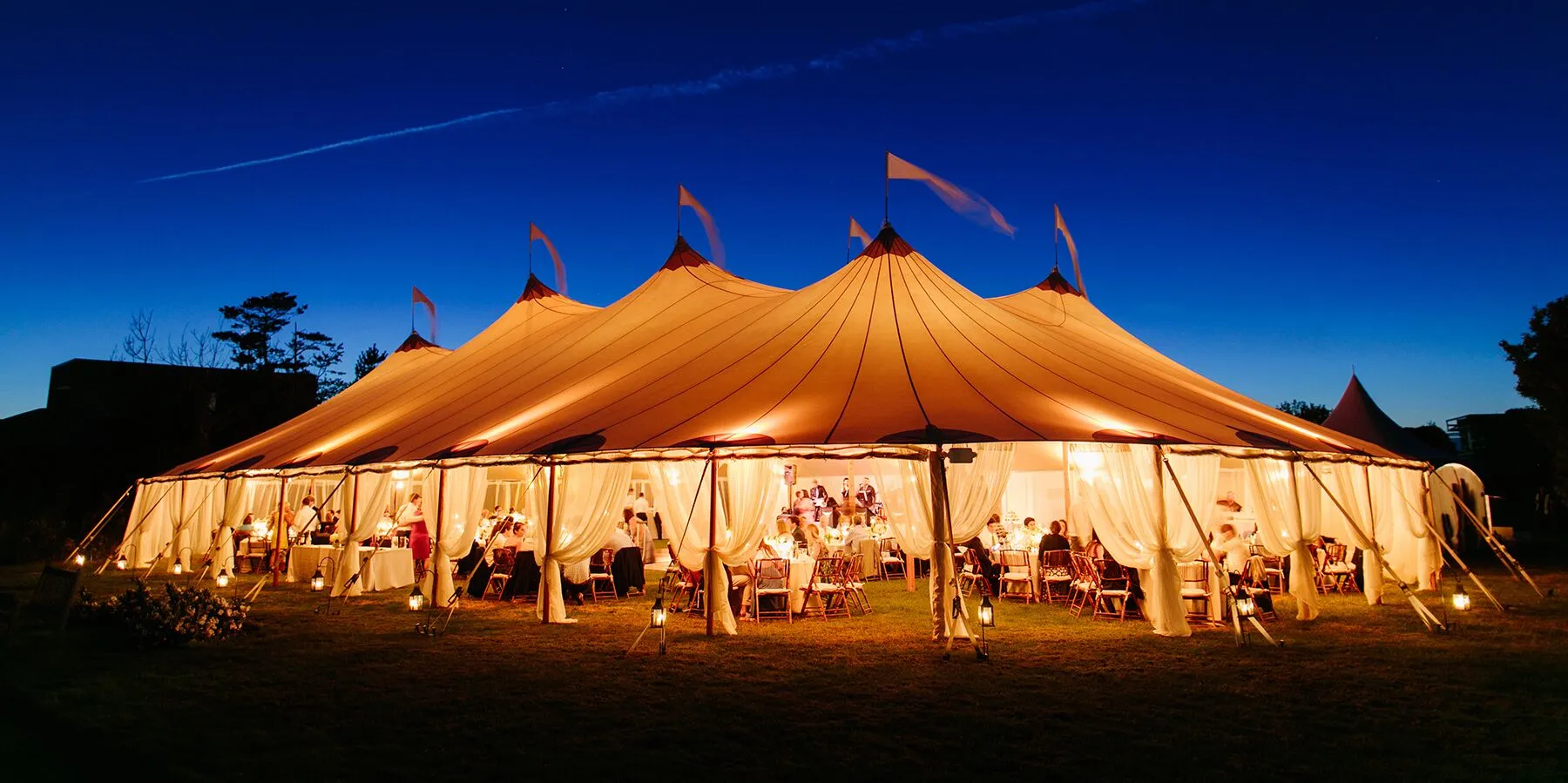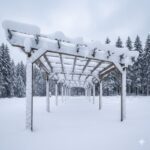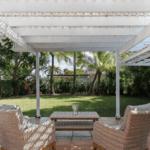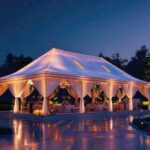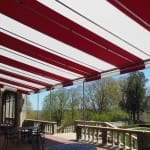Table of Contents
2. Understand Different Tent Types
3. Evaluate Site and Location Factors
4. Consider Weather Conditions
5. Plan for Amenities and Accessories
Secure the Perfect Tent for Your Connecticut Event with Durkin’s!
| Key Takeaways ✔ Determine the event type, guest count, and space needed to select a tent that ensures comfort and functionality. ✔ Understand the differences between frame, pole, and sailcloth tents to pick the best option for aesthetics, stability, and venue conditions. ✔ Assess the ground surface, available space, and any obstructions to ensure the tent fits securely and safely. ✔ Consider seasonal factors and invest in accessories like sidewalls, heaters, or ventilation to keep guests comfortable. ✔ Select appropriate flooring, lighting, and décor to enhance the ambiance and practicality of the tented space. ✔ Account for rental costs, setup fees, permits, and additional expenses to avoid unexpected costs. ✔ Work with experienced tent rental companies for expert guidance, site visits, and compliance with safety regulations. |
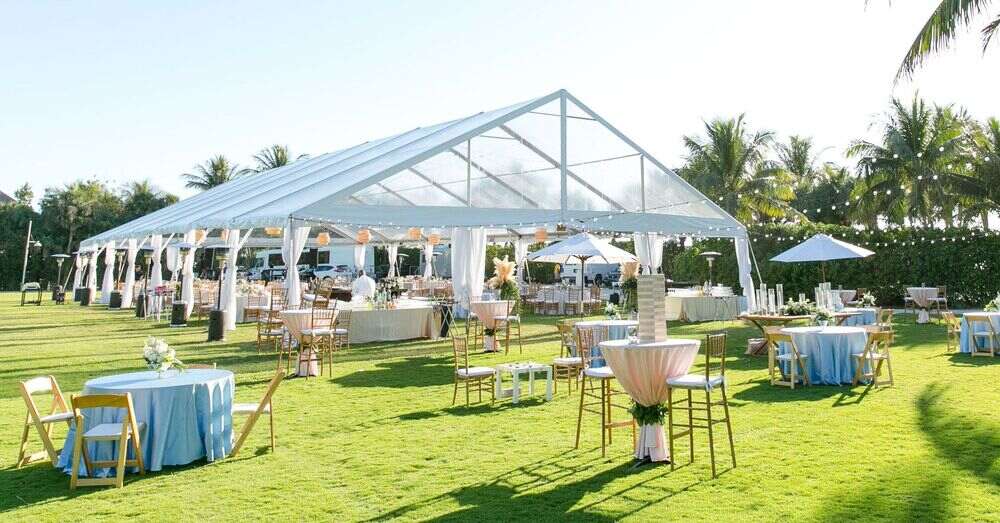
1. Assess Event Requirements
Before selecting a tent to rent, it is essential to evaluate the specific needs of the event, including its purpose, guest count, and additional space requirements to ensure a comfortable and well-organized setup.
Determine the Event Type and Purpose
The type of event being hosted plays a crucial role in selecting the right tent to rent. Each occasion has unique requirements that influence the tent’s size, structure, and accessories.
- Weddings – Require elegant, high-peak tents with drapery, chandeliers, and a spacious layout. The wedding industry continues to be a key contributor to the growth of the party supply rental market. Demand for event rentals, including tents, tables, chairs, linens, lighting, and dance floors, remains consistently strong as couples seek customizable and elegant setups for their special day.
- Corporate Events – Often need structured frame tents with branding opportunities and clear divisions for presentations, networking, and dining.
- Festivals & Fairs – Need large tents with open sides for accessibility, allowing smooth guest flow and vendor setup.
- Backyard Parties & Gatherings – Smaller tents or pop-up canopies provide cozy and intimate settings.
- Trade Shows & Exhibitions – Require durable tents with customizable layouts for booths and interactive spaces.
Estimate the Number of Attendees
Choosing the right tent to rent requires an accurate headcount to ensure adequate space for guests and activities. Proper guest capacity planning prevents overcrowding and enhances the guest experience.
- Guest Seating – Determine if seating will be banquet-style, theater-style, or lounge seating.
- Aisles & Walkways – Provide enough space for easy movement, avoiding congestion.
- Standing Room vs. Seated Events – Cocktail parties and trade shows may require more open space, while sit-down dinners need well-arranged seating.
- Emergency Exits & Accessibility – Ensure pathways and exits comply with safety regulations and accommodate all guests, including those with mobility challenges.
Consider Additional Space Needs
Apart from seating, other elements need to be factored into space requirements when choosing a tent to rent. A well-planned layout ensures the tent to rent accommodates every aspect of the event seamlessly.
- Dance Floors – Essential for weddings, parties, and corporate galas.
- Buffet & Catering Areas – Require extra space for food tables, service stations, and bar setups.
- VIP Lounges & Relaxation Zones – Common for corporate events, festivals, and high-end gatherings.
- Entertainment & Stages – Bands, DJs, and speakers need an area for sound equipment and performance setups.
- Storage & Staff Areas – Caterers, organizers, and security teams may need private areas for equipment and preparation.
2. Understand Different Tent Types
Choosing the right tent to rent starts with understanding the different types available, as each tent style offers unique benefits suited for various event sizes, locations, and aesthetics.
Frame Tents
Frame tents are a top choice for many events due to their flexibility and adaptability. For a tent to rent that fits a variety of locations and event types, frame tents are a solid option.
- No Center Poles – Provides a clear, open layout with unobstructed views.
- Ideal for Any Surface – Can be set up on concrete, grass, or asphalt using weights or stakes.
- Weather Resistant – Can withstand moderate wind and rain with proper anchoring.
- Customizable – Walls, doors, windows, and flooring can be added.
Pole Tents
Pole tents are known for their traditional and elegant appearance, making them ideal for formal events. If looking for a tent to rent that provides a grand visual impact, pole tents are a great choice.
- High Peaks & Elegant Look – Creates a classic, aesthetically pleasing setting.
- Requires Soft Ground – Must be staked into grass or dirt, limiting placement options.
- Spacious & Cost-Effective – Generally more affordable than frame tents of the same size.
- More Weather-Dependent – Strong winds can impact stability, requiring additional anchoring.
Sailcloth Tents
Sailcloth tents offer a unique blend of elegance and functionality, making them a popular choice for weddings, upscale gatherings, and outdoor celebrations. These tents feature translucent fabric, which allows natural light to filter through during the day and creates a warm, glowing ambiance at night.
- Graceful High-Peak Design – The sculpted peaks and flowing fabric provide a refined, airy aesthetic.
- Durable Yet Lightweight – Constructed with sturdy, weather-resistant materials while maintaining a light and elegant look.
- Natural Illumination – The semi-transparent sailcloth enhances the atmosphere with soft, diffused lighting.
- Versatile for Various Terrains – Can be securely anchored on grass, sand, or other outdoor surfaces.
- Enhanced Wind and Rain Resistance – Designed to withstand mild to moderate weather conditions while offering excellent ventilation.
3. Evaluate Site and Location Factors
Selecting the right tent to rent requires careful evaluation of the event site and location, considering factors such as ground surface, available space, and local regulations to ensure a secure and well-fitted setup.
Analyze Ground Surface
The surface where the tent to rent will be set up impacts the type of tent that can be used. Selecting a tent to rent based on ground conditions prevents stability issues and ensures a smooth event setup.
- Grass or Dirt – Works well with pole tents, frame tents, and marquee tents. Stakes provide strong anchoring.
- Concrete or Asphalt – Requires frame tents with weighted ballasts instead of stakes.
- Sand or Beachfront – Needs reinforced anchoring systems and heavier frame tents.
- Hills & Uneven Terrain – May require a leveled platform before tent installation.
Measure Available Space
Before committing to a tent to rent, measuring the event site is essential. Accurate site measurements help in choosing the right tent to rent without last-minute surprises.
- Account for Walkways & Perimeter Space – Ensure room for guest movement outside the tent.
- Avoid Overcrowding – Choose a tent size that allows guests to move freely.
- Check for Overhead Obstructions – Avoid areas with trees, power lines, or low-hanging structures.
- Consider Parking & Access – Ensure there is enough room for guest entry, parking, and deliveries.
Check for Permits and Regulations
Some locations have strict regulations when it comes to temporary tent installations. Before renting a tent to rent, check for:
- Local Permits – Some cities require special permits for large tent structures. In Granby, CT, for example, tents larger than 350 square feet require a building permit and the installation must be inspected for safety by local building officials or fire marshals.
- Fire Safety Regulations – Ensure tents meet fire-resistant material requirements.
- Weight & Size Restrictions – Some venues have size limitations for temporary structures.
- Noise Restrictions – Certain locations may have sound regulations, especially for evening events.
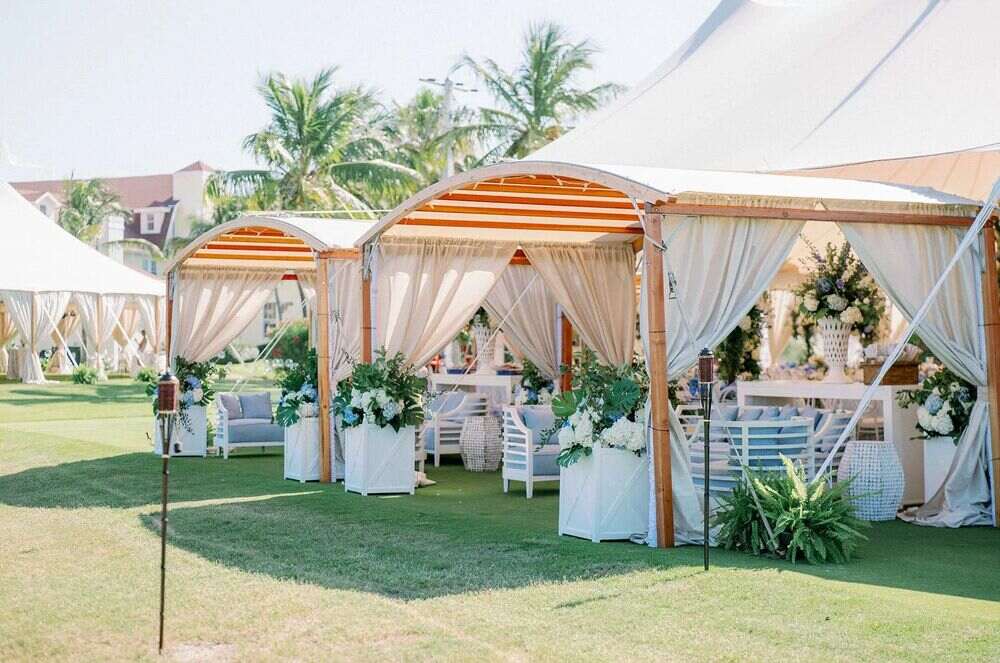
4. Consider Weather Conditions
Weather plays a crucial role in determining the right tent to rent for any event. A well-prepared tent setup ensures guests remain comfortable, no matter the season or unexpected weather changes.
Seasonal Factors
Outdoor events are always at the mercy of nature, making it important to choose a tent to rent that can withstand different weather conditions.
Summer & Warm Climates
- Opt for tents with open sides or ventilation panels to improve airflow.
- Consider shade structures to reduce direct sun exposure.
- Use UV-resistant tent fabric to prevent heat buildup inside the tent.
Winter & Cold Weather
- Choose fully enclosed tents with sidewalls to retain warmth.
- Incorporate tent heaters and insulation for guest comfort.
- Use double-layered tent fabric for added protection against wind and cold.
Rainy Seasons
- Ensure the tent has waterproof or rain-resistant fabric.
- Use elevated flooring to prevent water from pooling inside the tent.
- Install gutter systems between multiple tents to direct rainwater away from the venue.
Windy Conditions
- Select a sturdy frame tent with reinforced anchoring.
- Avoid lightweight pop-up tents that may not withstand strong gusts.
- Use sidewalls with weighted panels to prevent wind from disrupting the event.
Tent Accessories for Climate Control
Climate control solutions can make a major difference in maintaining a comfortable environment inside a tent to rent. Depending on the season and weather conditions, consider the following accessories:
- Sidewalls – Protect guests from wind, rain, and excessive sunlight. Clear sidewalls allow natural light while maintaining visibility.
- Heaters – Ideal for fall and winter events, tent heaters ensure guests stay warm without compromising safety.
- Air Conditioning Units – Essential for summer weddings and corporate events, portable AC units help regulate the temperature inside enclosed tents.
- Ceiling Fans & Ventilation Panels – Improve air circulation and prevent heat buildup in warm climates.
- Misting Systems – Great for outdoor festivals and hot weather, misting fans provide cooling relief.
5. Plan for Amenities and Accessories
A tent to rent is more than just a shelter; it serves as the foundation for the entire event setup. The right accessories can elevate the space and provide a seamless experience for attendees.
Flooring Options
The type of flooring chosen for a tent to rent depends on the event type, venue terrain, and guest expectations.
- Carpeted Flooring – Adds a touch of elegance and is great for formal events.
- Wooden Panels – Sturdy and suitable for high-end gatherings and weddings.
- Plastic Tile Flooring – Affordable, lightweight, and easy to install.
- Turf or Grass Covering – Ideal for outdoor-themed events that want a natural feel.
- Raised Platform Flooring – Essential for areas prone to flooding or uneven surfaces.
Lighting Solutions
The right lighting setup transforms a tent to rent into a well-lit, inviting space. Strategically placed lighting not only improves visibility but also contributes to the overall atmosphere of the event.
- Chandeliers – Perfect for weddings and upscale events, adding sophistication and elegance.
- String Lights & Fairy Lights – Create a magical ambiance, ideal for evening events.
- LED Uplighting – Enhances the tent’s structure and provides customizable colors for themed events.
- Spotlights & Stage Lighting – Essential for corporate events, concerts, and performances.
- Lanterns & Pendant Lights – Provide warm, soft lighting for intimate gatherings.
Furniture and Decor
A tent to rent should reflect the event’s theme and provide functional yet stylish furnishings. Coordinating furniture and decor ensures the event space feels cohesive, inviting, and well-organized.
- Tables & Chairs – Choose based on event formality; round tables work well for weddings, while rectangular tables are great for corporate events.
- Linens & Drapery – Adds a decorative element while enhancing the overall color scheme.
- Lounge Seating – Ideal for relaxed settings, VIP areas, and cocktail parties.
- Stage & Backdrops – Necessary for performances, speeches, and entertainment.
- Floral Arrangements & Centerpieces – Elevate the event’s aesthetics and enhance guest experience.
6. Consider Your Budget
Budgeting is a critical factor when selecting a tent to rent. While cost varies based on size, type, and additional features, proper financial planning helps prevent unexpected expenses.
Rental Costs
Requesting quotes from multiple vendors can help find the best deal without sacrificing quality. The price of a tent to rent is influenced by several factors, including:
- Tent Size – Larger tents cost more due to additional materials and labor required for setup.
- Tent Type – Frame tents, pole tents, and marquee tents come at different price points.
- Rental Duration – Multi-day events may incur additional rental charges.
- Customization & Add-Ons – Sidewalls, flooring, lighting, and decor can increase the total cost.
Additional Expenses
Beyond the basic tent rental fee, there are additional costs that event planners should consider:
- Delivery & Transportation Fees – Depending on location, delivery charges may vary.
- Setup & Breakdown Costs – Some rental companies charge separately for installation and dismantling.
- Permit Fees – Certain venues or cities require permits for large tent structures.
- Damage Deposits & Insurance – Some companies require refundable security deposits or event insurance.
7. Consult with Professionals
Renting a tent may seem straightforward, but ensuring it meets all event requirements takes expertise. Working with experienced professionals not only simplifies the selection process but also minimizes risks associated with improper tent installation, weather conditions, and space constraints.
Seek Expert Advice
Choosing a tent to rent without professional input could lead to costly mistakes, such as selecting the wrong size, ignoring site limitations, or failing to comply with local regulations.
Here’s what expert consultation can offer:
Personalized Recommendations
Experts assess the event type, guest count, and site conditions to recommend the best tent to rent. They suggest the right tent type (frame, pole, or marquee) based on the venue and desired aesthetic. They also help determine the necessary add-ons, such as sidewalls, flooring, and heating/cooling options.
Safety & Compliance Guidance
Many cities require permits for large tent structures, which professionals can help secure. They ensure the tent is properly anchored, meeting safety standards for wind and weather resistance. Fire safety is a major consideration, and rental companies ensure the tent material is fire-resistant and meets local codes.
Backup Plans for Weather Emergencies
Professionals offer contingency plans in case of unexpected rain, high winds, or extreme heat. They can recommend reinforced tent options or suggest weatherproofing solutions, such as elevated flooring and gutter systems. Having a tent rental expert means access to last-minute adjustments, ensuring the event continues smoothly.
Package Deals & Cost Savings
Many companies provide bundled services that include lighting, flooring, furniture, and accessories, reducing the hassle of hiring multiple vendors. Rental professionals can recommend budget-friendly options without sacrificing quality. Their expertise helps avoid hidden costs, such as setup and breakdown fees, which may not be included in standard pricing.
Site Visits and Consultations
A professional site inspection is one of the most crucial steps in securing the right tent to rent. Without an on-site evaluation, event planners risk choosing a tent that does not fit properly, lacks proper anchoring, or fails to meet safety regulations. Here’s what a tent rental expert evaluates during a site visit:
Terrain & Space Assessment
Professionals measure the event space to ensure the selected tent fits within the venue’s dimensions. They check for potential obstructions, such as trees, uneven ground, or overhead wires, that could interfere with tent setup. They also ensure there’s enough space for additional event elements, such as walkways, catering areas, and seating arrangements.
Anchoring Requirements
The method of securing a tent to rent depends on the ground surface. Grass or dirt surfaces allow for staking, while concrete or asphalt requires weighted ballasts. Rental experts determine the most secure anchoring method to prevent wind-related issues.
Accessibility Planning
Entry and exit points are planned to prevent congestion. Restrooms, emergency exits, and catering stations must be easily accessible. ADA-compliant pathways are considered for guests with mobility challenges.
Weather Preparedness
Experts assess whether the venue is prone to high winds, heavy rain, or extreme temperatures. They recommend tent reinforcements or additional weatherproofing elements based on the season. Drainage considerations are addressed to prevent water pooling in case of rain.
Frequently Asked Questions
What size tent do I need for my event?
The tent size depends on the number of guests, seating arrangements, and any additional space for dining, dancing, or entertainment. A general rule is to allow 10-12 square feet per seated guest and more for standing or buffet-style events. Consulting a tent rental company can help determine the best size for your venue and setup.
What factors affect the price of renting a tent?
The cost varies based on tent size, type, rental duration, setup complexity, and location. Additional expenses may include flooring, lighting, climate control, and permits if required. Comparing quotes from different rental companies ensures you get the best deal while meeting all event requirements.
Can I set up a rented tent on any surface?
Most tents can be installed on grass, concrete, asphalt, or sand, but the anchoring method differs depending on the surface. Grass allows for traditional staking, while concrete or asphalt requires weighted ballasts to secure the tent. Discussing your venue with the rental provider ensures proper installation and stability.
Do I need a permit to set up a tent for my event?
Permit requirements vary by city, county, and tent size, with some locations requiring approval for large tents or enclosed structures. It’s important to check with local authorities or the rental company to determine if a permit is needed. Failing to obtain the necessary permits may result in fines or delays in setup.
What additional equipment should I consider renting with the tent?
Depending on the event, you may need sidewalls for weather protection, flooring for stability, and lighting for ambiance. Heating or cooling systems are essential for seasonal events, while furniture and décor enhance guest comfort. Discussing your needs with a tent rental professional ensures all essential add-ons are included.
Secure the Perfect Tent for Your Connecticut Event with Durkin’s!
For over a century, Durkin’s Inc. has been the trusted provider of premium tent rentals in Connecticut, offering unparalleled service and a diverse selection of tents to suit any occasion. With a reputation built on quality and reliability, we provide a range of tent styles, including elegant sailcloth tents and versatile frame tents, ensuring a perfect fit for any event size and theme.
Contact Durkin’s today to discuss your event needs and secure the perfect tent for your special day!

